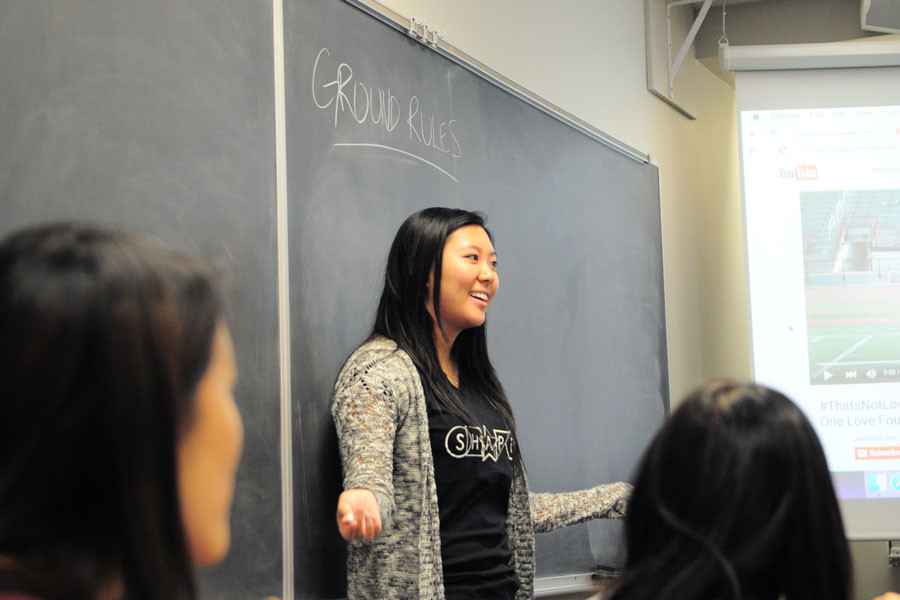Students speak out on avoiding abusive relationships
Lauren Duquette/The Daily Northwestern
Northwestern students give input Tuesday evening on what constitutes a healthy relationship. The discussion was part of a joint effort by Sigma Psi Zeta, MARS, SHAPE and CARE to promote domestic violence awareness.
October 21, 2015
As part of its domestic violence awareness campaign, Sigma Psi Zeta invited students to discuss healthy relationships on campus to discourage abusive relationships.
The Asian-interest sorority collaborated with Sexual Health and Assault Peer Educators, Men Against Rape and Sexual Assault, and the Center for Awareness, Response and Education as part of its annual Purple Ribbon Week, which supports awareness of domestic violence. CARE advisers Erin Clark and Paul Ang began the discussion, attended by about 25 students.
Clark kicked off the discussion by addressing different kinds of violence in relationships. The two CARE advisers emphasized that relationship violence is not only physical but can also be verbal, emotional, financial or academic. The speakers proposed a “relationship bill of rights,” detailing various individual liberties and boundaries people in healthy relationships should have.
The speakers said 32 percent of American college students have experienced some sort of relationship violence in their lives.
“Boundaries need to be clearly defined and communicated,” Clark said. “And one needs to be prepared in case boundaries are crossed.”
The audience interjected in the discussion, expressing personal opinions on relationship boundaries and definitions of a healthy relationship. Students then discussed potential relationship conflicts in college, the impact they would have on the person and what they would want to happen.
Ang turned the conversation toward methods of handling relationship conflicts in an effective manner. He said all relationships experience conflict and that conflicts are not intrinsically unhealthy.
“All of us are involved in relationship conflicts at times,” Ang said. “But we need to make sure we approach conflicts in a respectful manner and grow from them.”
Student hosts took over for the latter half of the seminar. They split the audience into two groups of seven to eight students, for more intimate discussions.
Cindy Chen, the president of Sigma Psi Zeta, helped lead these discussions with other members of her sorority, as well as students from SHAPE and MARS.
“Our sorority decided to host this because it’s Domestic Violence Awareness month, so we wanted to raise awareness about potential relationship violence on campus,” Chen said.
The topics discussed in these groups included the transition from high school to college relationships, how alcohol and partying can affect relationships, how to spot potentially unhealthy relationships, and how to support friends going through relationship issues.
“Personally, I have trouble talking to partners about the relationship, because I don’t want them to be too stressed out,” Medill sophomore Andrea Zhang said. “Most kids are already so stressed with schoolwork, so lack of communication becomes a common issue.”
During one of the discussions, Tiffany Teng, a Weinberg junior, said it is important to note red flags in relationships.
“A good rule to have is to compare your relationship to a regular friendship, and think about whether something a partner says or does would be acceptable in a regular friendship,” she said. “You shouldn’t make exceptions for your partner.”
Email: [email protected]


